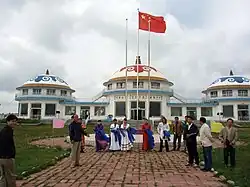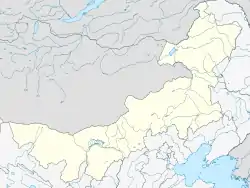Ulanqab
乌兰察布市 • ᠤᠯᠠᠭᠠᠨᠴᠠᠪ ᠬᠣᠲᠠ | |
|---|---|
 Huanghuagou, a grassland scenic spot near Ulanqab | |
.svg.png.webp) Location of Ulanqab City jurisdiction in Inner Mongolia | |
 Ulanqab Location of the city centre in Inner Mongolia | |
| Coordinates (Ulanqab government): 40°59′38″N 113°07′55″E / 40.994°N 113.132°E | |
| Country | People's Republic of China |
| Autonomous region | Inner Mongolia |
| Municipal seat | Jining District |
| Area | |
| • Prefecture-level city | 54,473.6 km2 (21,032.4 sq mi) |
| • Urban (2017)[1] | 521.6 km2 (201.4 sq mi) |
| • Metro | 2,965.6 km2 (1,145.0 sq mi) |
| Elevation | 1,378 m (4,521 ft) |
| Population (2020 census[2]) | |
| • Prefecture-level city | 1,706,328 |
| • Density | 31/km2 (81/sq mi) |
| • Urban | 425,059 |
| • Urban density | 810/km2 (2,100/sq mi) |
| • Metro | 550,231 |
| • Metro density | 190/km2 (480/sq mi) |
| Time zone | UTC+8 (China Standard) |
| Postal code | 012000 |
| Area code | (0)474 |
| ISO 3166 code | CN-NM-09 |
| Licence Plate Prefix | 蒙J |
| Website | wulanchabu |
| Ulanqab | |||||||
|---|---|---|---|---|---|---|---|
| Chinese name | |||||||
| Simplified Chinese | 乌兰察布 | ||||||
| Traditional Chinese | 烏蘭察布 | ||||||
| |||||||
| Mongolian name | |||||||
| Mongolian Cyrillic | Улаанцав хот | ||||||
| Mongolian script | ᠤᠯᠠᠭᠠᠨᠴᠠᠪ ᠬᠣᠲᠠ | ||||||
| |||||||
Ulanqab or Ulan Chab (Chinese: 乌兰察布; pinyin: Wūlánchábù; Mongolian: ![]() Ulaɣančab qota; Mongolian cyrillic.Улаанцав хот) is a region administered as a prefecture-level city in south-central Inner Mongolia, China. Its administrative centre is in Jining District, which was formerly a county-level city. It was established as a prefecture-level city on 1 December 2003, formed from the former Ulanqab League. The Ulanqab Stadium is located in the city.
Ulaɣančab qota; Mongolian cyrillic.Улаанцав хот) is a region administered as a prefecture-level city in south-central Inner Mongolia, China. Its administrative centre is in Jining District, which was formerly a county-level city. It was established as a prefecture-level city on 1 December 2003, formed from the former Ulanqab League. The Ulanqab Stadium is located in the city.
Ulaan Chab city has an area of 54,473.6 square kilometres (21,032.4 sq mi). It borders Hohhot to the west, Mongolia to the north, Xilin Gol League to the northeast, Hebei to the east and Shanxi to the south. As of the 2020 census, its total population was, 1,706,328 inhabitants (2,143,590 in 2010) whom 550,231 inhabitants lived in the built-up (or metro) area made of Jining District and Qahar Right Front Banner largely conurbated in its northern part.[3]
The western part of Ulaan Chab used to be part of the now-defunct Chinese province of Suiyuan.
Administrative subdivisions
Ulaan Chab has eleven administrative divisions: one district, one county-level city, five counties and four banners:
| Map | |||||||
|---|---|---|---|---|---|---|---|
| Name | Mongolian | Hanzi | Hanyu Pinyin | Population (2010 est.) |
Area (km²) | Density (/km²) | |
| Jining District | ᠵᠢᠨᠢᠩ ᠲᠣᠭᠣᠷᠢᠭ (Jiniŋ toɣoriɣ) |
集宁区 | Jíníng Qū | 356,135 | 418 | 851 | |
| Fengzhen city | ᠹᠧᠩᠵᠧᠨ ᠬᠣᠲᠠ (Fėŋjėn qota) |
丰镇市 | Fēngzhèn Shì | 245,608 | 2,704 | 90 | |
| Zhuozi County | ᠵᠦᠸᠧᠽᠢ ᠰᠢᠶᠠᠨ (Jüvėdzi siyan) |
卓资县 | Zhuózī Xiàn | 136,965 | 3,119 | 43 | |
| Huade County | ᠬᠤᠸᠠᠳᠧ ᠰᠢᠶᠠᠨ (Quvadė siyan) |
化德县 | Huàdé Xiàn | 123,535 | 2,527 | 48 | |
| Shangdu County | ᠬᠤᠸᠠᠳᠧ ᠰᠢᠶᠠᠨ (Šaŋdu siyan) |
商都县 | Shāngdū Xiàn | 234,417 | 4,304 | 54 | |
| Xinghe County | ᠰᠢᠩᠾᠧ ᠰᠢᠶᠠᠨ (Siŋhė siyan) |
兴和县 | Xīnghé Xiàn | 220,067 | 3,519 | 62 | |
| Liangcheng County | ᠯᠢᠶᠠᠩᠴᠠᠩ ᠰᠢᠶᠠᠨ (Liyaŋčaŋ siyan) |
凉城县 | Liángchéng Xiàn | 185,954 | 3,451 | 53 | |
| Qahar Right Front Banner (Qahar Barun Garun Omnod Banner) |
ᠴᠠᠬᠠᠷ ᠪᠠᠷᠠᠭᠤᠨ ᠭᠠᠷᠤᠨ ᠡᠮᠦᠨᠡᠳᠦ ᠬᠣᠰᠢᠭᠤ (Čaqar Baraɣun Ɣarun Emünedü qosiɣu) |
察哈尔右翼前旗 | Cháhā'ěr Yòuyì Qián Qí | 164,434 | 2,734 | 60 | |
| Qahar Right Middle Banner (Qahar Barun Garun Dundad Banner) |
ᠴᠠᠬᠠᠷ ᠪᠠᠷᠠᠭᠤᠨ ᠭᠠᠷᠤᠨ ᠳᠤᠮᠳᠠᠳᠤ ᠬᠣᠰᠢᠭᠤ (Čaqar Baraɣun Ɣarun Dumdadu qosiɣu) |
察哈尔右翼中旗 | Cháhā'ěr Yòuyì Zhōng Qí | 149,483 | 4,200 | 35 | |
| Qahar Right Rear Banner (Qahar Barun Garun Hoit Banner) |
ᠴᠠᠬᠠᠷ ᠪᠠᠷᠠᠭᠤᠨ ᠭᠠᠷᠤᠨ ᠬᠣᠶᠢᠲᠤ ᠬᠣᠰᠢᠭᠤ (Čaqar Baraɣun Ɣarun Qoyitu qosiɣu) |
察哈尔右翼后旗 | Cháhā'ěr Yòuyì Hòu Qí | 150,174 | 3,803 | 39 | |
| Dorbod Banner | ᠳᠥᠷᠪᠡᠳ ᠬᠣᠰᠢᠭᠤ (Dörbed qosiɣu) |
四子王旗 | Sìzǐwáng Qí | 176,818 | 24,016 | 7 | |
Geography and climate
Ulanqab features a cold semi-arid climate (Köppen BSk), marked by long, cold and very dry winters, warm, somewhat humid summers, and strong winds, especially in spring. More than half of the annual precipitation of around 340 millimetres (13.4 in) falls in July and August alone.
| Climate data for Ulanqab (Jining District, 1991–2020 normals, extremes 1971–2010) | |||||||||||||
|---|---|---|---|---|---|---|---|---|---|---|---|---|---|
| Month | Jan | Feb | Mar | Apr | May | Jun | Jul | Aug | Sep | Oct | Nov | Dec | Year |
| Record high °C (°F) | 8.6 (47.5) |
13.5 (56.3) |
21.7 (71.1) |
30.1 (86.2) |
31.9 (89.4) |
35.4 (95.7) |
35.5 (95.9) |
32.5 (90.5) |
32.4 (90.3) |
24.6 (76.3) |
18.3 (64.9) |
8.8 (47.8) |
35.5 (95.9) |
| Mean daily maximum °C (°F) | −5.6 (21.9) |
−1.1 (30.0) |
5.7 (42.3) |
14.0 (57.2) |
20.3 (68.5) |
24.7 (76.5) |
26.4 (79.5) |
24.8 (76.6) |
19.8 (67.6) |
12.4 (54.3) |
3.1 (37.6) |
−4.2 (24.4) |
11.7 (53.0) |
| Daily mean °C (°F) | −12.5 (9.5) |
−8.3 (17.1) |
−1.3 (29.7) |
7.0 (44.6) |
13.7 (56.7) |
18.4 (65.1) |
20.5 (68.9) |
18.7 (65.7) |
13.0 (55.4) |
5.5 (41.9) |
−3.4 (25.9) |
−10.5 (13.1) |
5.1 (41.1) |
| Mean daily minimum °C (°F) | −17.7 (0.1) |
−14.0 (6.8) |
−7.5 (18.5) |
0.2 (32.4) |
6.7 (44.1) |
11.8 (53.2) |
14.7 (58.5) |
12.8 (55.0) |
6.9 (44.4) |
−0.3 (31.5) |
−8.3 (17.1) |
−15.2 (4.6) |
−0.8 (30.5) |
| Record low °C (°F) | −32.4 (−26.3) |
−30.6 (−23.1) |
−24.3 (−11.7) |
−14.5 (5.9) |
−6.0 (21.2) |
−0.1 (31.8) |
6.9 (44.4) |
0.0 (32.0) |
−6.5 (20.3) |
−14.5 (5.9) |
−27.8 (−18.0) |
−31.6 (−24.9) |
−32.4 (−26.3) |
| Average precipitation mm (inches) | 1.6 (0.06) |
2.3 (0.09) |
6.6 (0.26) |
16.3 (0.64) |
31.7 (1.25) |
51.6 (2.03) |
109.3 (4.30) |
69.4 (2.73) |
44.9 (1.77) |
18.9 (0.74) |
6.4 (0.25) |
1.7 (0.07) |
360.7 (14.19) |
| Average precipitation days (≥ 0.1 mm) | 2.0 | 2.3 | 3.7 | 4.5 | 7.0 | 11.7 | 13.3 | 11.1 | 9.1 | 5.1 | 2.7 | 1.9 | 74.4 |
| Average snowy days | 3.3 | 4.4 | 5.3 | 3.4 | 0.4 | 0 | 0 | 0 | 0.1 | 1.9 | 4.4 | 3.9 | 27.1 |
| Average relative humidity (%) | 55 | 48 | 41 | 36 | 38 | 49 | 61 | 62 | 58 | 53 | 55 | 55 | 51 |
| Mean monthly sunshine hours | 206.7 | 212.1 | 252.2 | 264.7 | 278.8 | 255.7 | 250.9 | 250.8 | 230.2 | 235.9 | 201.8 | 195.7 | 2,835.5 |
| Percent possible sunshine | 69 | 70 | 68 | 66 | 62 | 57 | 55 | 59 | 62 | 70 | 69 | 69 | 65 |
| Source 1: China Meteorological Administration[4][5] | |||||||||||||
| Source 2: Weather China[6] | |||||||||||||
Demographics
In the 2000 census, there were 2,284,414 inhabitants:
| Ethnic group | no. of inhabitants | share |
|---|---|---|
| Han | 2,203,345 | 96.45% |
| Mongols | 60,064 | 2.63% |
| Manchu | 11,792 | 0.52% |
| Hui | 7,683 | 0.34% |
| Koreans | 198 | 0.01% |
| Tujia | 185 | 0.01% |
| Miao | 175 | 0.01% |
| Other | 972 | 0.04% |
Transport
Ulanqab's transportation network is well-developed, connected by several railways and highways. Some of the railways the pass through the prefecture are the Beijing−Baotou, Jining−Erlianhot, and the Jining−Tongliao Railways. Major inter-provincial roads include the G6 Beijing–Lhasa Expressway (京藏高速), China National Highway 110 (Beijing to Yinchuan, Ningxia) and 208 (Erlianhot, Inner Mongolia to Changzhi, Shanxi). The city is also served by Ulanqab Jining Airport.
Known people from Ulanqab
- He Pingping (1988–2010) was the smallest walking man standing at just 73 cm (29 in)
- Guo Shuqing, banker, politician, Governor of Shandong
References
- 1 2 Ministry of Housing and Urban-Rural Development, ed. (2019). China Urban Construction Statistical Yearbook 2017. Beijing: China Statistics Press. p. 46. Retrieved 11 January 2020.
- ↑ "China: Inner Mongolia (Prefectures, Leagues, Cities, Districts, Banners and Counties) - Population Statistics, Charts and Map".
- ↑ "China: Inner Mongolia (Prefectures, Leagues, Cities, Districts, Banners and Counties) - Population Statistics, Charts and Map".
- ↑ 中国气象数据网 – WeatherBk Data (in Simplified Chinese). China Meteorological Administration. Retrieved 10 October 2023.
- ↑ 中国气象数据网 (in Simplified Chinese). China Meteorological Administration. Retrieved 10 October 2023.
- ↑ 集宁 - 气象数据 -中国天气网 (in Chinese). Weather China. Retrieved 29 November 2022.
